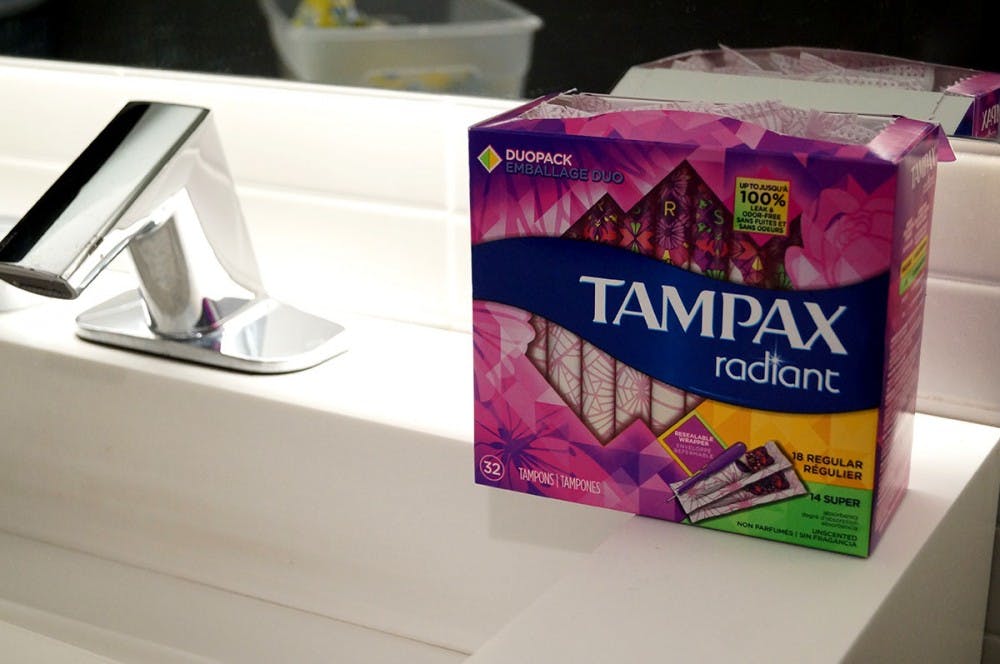Individuals who menstruate pay more to live their daily lives than those who do not. On average, women, non-binary and transgender individuals who menstruate spend 2,353 days — or seven years — on their period. With the average box of tampons costing seven dollars, costs quickly add up. Over the course of a lifetime, individuals who menstruate spend nearly $1,800 on tampons alone, not including other costs associated with menstruation, such as birth-control, midol and pads. In addition to tampons and other necessities of menstruation comes a hefty sales tax.
Ask anyone who has ever had a period — tampons or pads are a necessity. Unfortunately, many legislators do not see it this way. Currently, 36 states have laws that tax tampons and other products associated with menstruation. In many states, “necessities” such as ChapStick, dandruff shampoo and Viagra are exempted from sales tax. Thousands of other personal health products are similarly exempt from sales tax in most states. If Viagra is considered a “necessity,” then why aren’t tampons?
The tampon tax debate is not new. Activists have been pushing for an abolition of sales tax on tampons and other products associated with menstruation for many years. Additionally, this debate is not isolated to the U.S. — activists across the globe are advocating the removal the tampon tax. In 2015, Canada removed all taxes on menstrual hygiene products, demonstrating there are certainly precedents for states to follow when drafting policy exempting menstrual hygiene products from sales tax.
While the sales tax on tampons is not excessive, it is nevertheless a tax. For individuals who live paycheck to paycheck, this tax, along with the costs of menstrual hygiene products, adds up. Additionally, the tax itself is inherently unfair — individuals who menstruate should not have to pay more for basic necessities than those who do not. While the exact sales tax on tampons and products associated with menstruation varies state by state, the issues of accessibility and inequality persist. The tampon tax places an undue burden on individuals who mensturate in the 36 states that have a sales tax on menstrual hygiene products.
When examining these issues, it is important to note that comparatively, individuals who menstruate in the U.S. are much better off than their counterparts in other parts of the world. For many people across the globe, access to tampons and pads are the beginning of the challenge — bathrooms with proper sanitation and hygiene facilities are rare. In some areas of Venezuela, menstruating individuals are forced to sleep outside their homes for the duration of their periods. In other nations, menstrual hygiene products are scarce, and their lack of use can cause serious health issues.
For young people, menstruation presents a myriad of additional obstacles. Periods cause students across the globe to miss 10-20 percent of the school year. Despite these statistics, there is reason for hope. Thankfully, awareness about the challenges individuals who menstruate face is increasing. “Period. End of Sentence,” a short film about menstruation and education in India, won a 2019 Academy Award. This film has helped to bring to light the societal barriers across the world associated with periods by exemplifying the issues of accessibility and inequality associated with menstruation. However, more work needs to be done here and abroad to mitigate this issues.
Thankfully, at the University, student leaders are taking initiative to remove barriers increase access to feminine hygiene products. The ISC and Student Council have partnered numerous times throughout the past year to provide free menstrual hygiene products in select bathrooms across Grounds. These students recognized the burdens of periods for many students and took admirable steps to limit these economic inequalities, and hopefully in the future, this will become a permanent and sustainable program. If students at the University view menstruation as an issue of accessibility and equality, then legislators should as well.
Individuals who menstruate already face a myriad of obstacles and costs associated with their monthly periods. Legislators should work to mitigate this inequality in every way possible. While providing free menstrual hygiene products at a local, state or federal level is not necessarily feasible, removing state sales tax on tampons, pads and other menstrual hygiene products is. The tampon tax not only creates an economic barrier but also a symbolic one. Those who menstruate are reminded of the societal stigmatism of periods every time they purchase a box of tampons. Despite the increasing awareness of menstruation struggles across the globe raised by films such as “Period. End of Sentence,” our society continues to treat periods as a taboo topic. Legislators must follow the pioneering spirit of student leaders at the University and embrace menstruation by removing the tampon tax. It is time that those who menstruate receive fair treatment under the law.
Mary Alice Kukoski is an Opinion Columnist for The Cavalier Daily. She can be reached at opinion@cavalierdaily.com.
**







